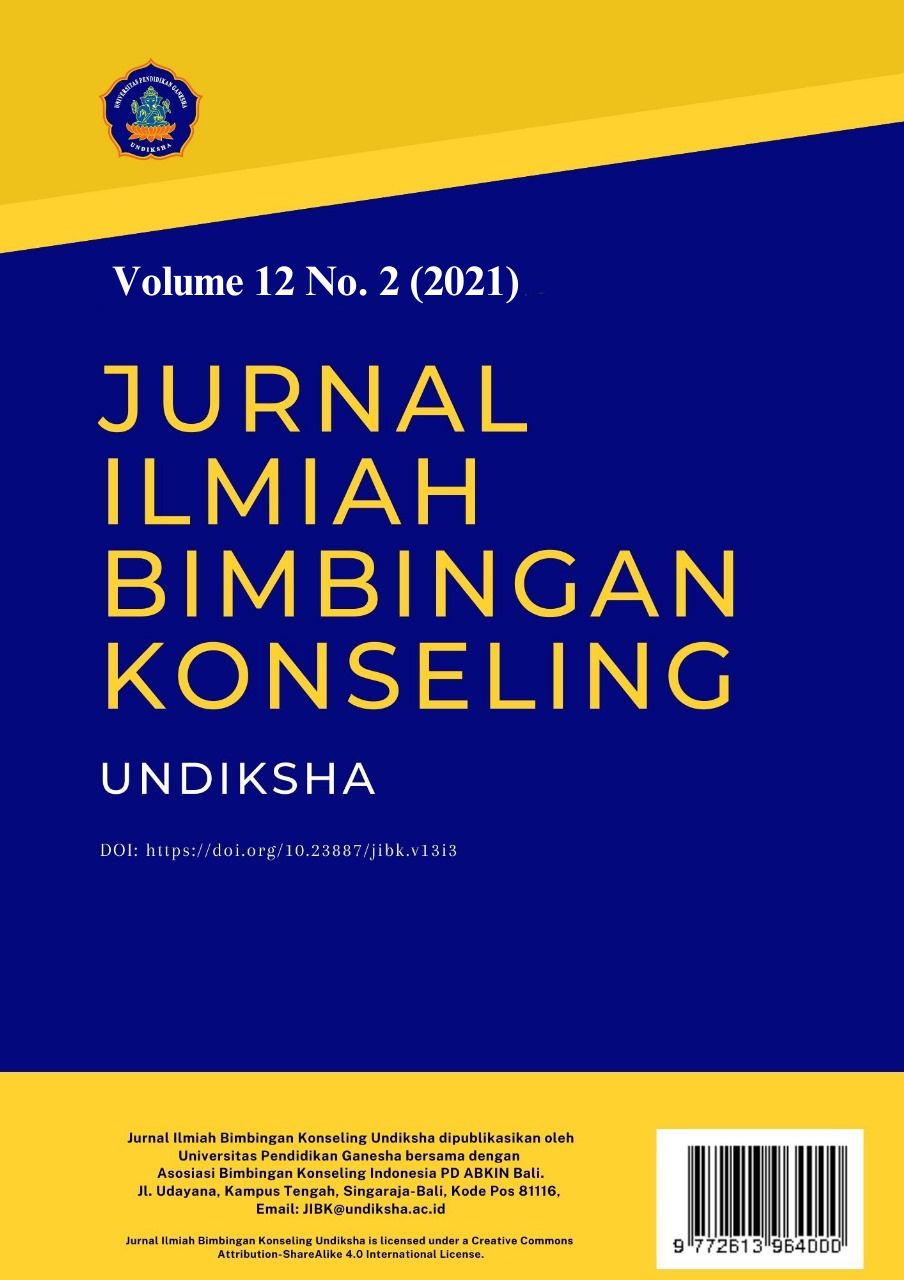Hubungan Antara Gratitude dengan Stres Kerja Pada Guru Sekolah Luar Biasa
DOI:
https://doi.org/10.23887/jibk.v12i2.34083Keywords:
gratitude, stres kerja, guruAbstract
Penelitian ini bertujuan untuk mengetahui hubungan gratitude dengan stres kerja pada guru sekolah luar biasa. Metode penelitian yang digunakan dalam penelitian ini adalah metode kuantitatif. Sampel dalam penelitian ini berjumlah 46 orang yang diambil menggunakan teknik quota sampling. Data penelitian diperoleh melalui wawancara dan kuesioner. Pengumpulan data variable gratitude menggunakan The Gratitude Questionnaires Six Item Form (GQ-6) oleh Michael E. McCullough, Robert A. Emmons, dan Jo-Ann Tsang (2002) yang terdiri dari 6 aitem, sementara variable stres kerja menggunakan Occupational Stress Indicator (OSI) oleh Cooper dan Williams (1988) yang terdiri dari 40 aitem. Analisis data menggunakan analisis korelasi. Hasil penelitian menunjukkan bahwa nilai r = -0,372 ; p > 0,05. Kesimpulan penelitian ini adalah gratitude berhubungan negatif terhadap variabel stres kerja.
References
Allen, K. E & Schwartz, I. S (2001). Anak yang luar biasa: Inklusi di awal pendidikan anak-anak ( edisi ke- 4 ) . New York: Thomson Learning Inc.
Aziz, R., Wahyuni, E. R., & Wargadinata, W. (2017). Kontribusi bersyukur dan memaafkan dalam mengembangkan kesehatan mental di tempat kerja. Jurnal Psikologi dan Kesehatan Mental, 2(1), 33-4.
Cahyono, E.W. (2014). Pelatihan gratitude (bersyukur) untuk penurunan stres kerja karyawan di PT “X”. Jurnal Ilmiah Mahasiwa Universitas Surabaya, 3(1), 1–15.
Cooper, C.L., Sloan, S.J. & William, S. (1988). Occupational stress indicator management Guide. Oxford: NFERNelson Publishing Company Limited.
Glowinkowski, S. P,. & Cooper, C. L. (1986). Organisational issues in stress research. Journal of Managerial Psychology, 1(1), 3–11.
Depdiknas. (2003). Undang-Undang No.20 Tahun 2003 tentang Sistem Pendidikan Nasional. Jakarta.
Emmons, R.A. & Cumpler, C. A (2003). Gratitude as a human strength: appraising the evidence. Journal of Social and Clinical Psychology, 19(1), 56-69.
Emmons, R.A. & McCullough, M. E. (2003). Counting blessings versus burdens: An experimental investigation of gratitude and subjective well-being in daily life. Journal of Personality and Social Psychology, 84(2), 377–389.
Froh, J. J., Sefick, W. J., & Emmons, R. A. (2008). Counting blessings in early adolescents: an experimental study of gratitude and subjective well-being. Journal of School Psychology. 46, 213-233.
Kyriacou, C. & Chien, P. (2004). Teacher stress in Taiwanese primary schools. Journal of Educational Enquiry, 5(2).
Leguminosa, P., Nashori, F., & Rachmawati, M. A (2017). Pelatihan kebersyukuran untuk menurunkan stres kerja guru di sekolah inklusi. Jurnal Ilmiah Psikologi Terapan, 5(2).
Martin, A. F (2015). Gratitude and health : a brief intervention to reduce undergraduate stress. Dissertation. Colorado : Colorado State University.
McCullough, M. E., Emmons, R. A., & Tsang, J. A. (2002). The grateful disposition: A conceptual and empirical topography. Journal of Personality and Social Psychology, 82, (1), 112–127.
Peterson, C., Ruch, W., Beermann,. Park, N., & Seligman, M. E. P. (2007). Strengths of character, orientations to happiness, and life satisfaction. The Journal of Positive Psychology, 2(3), 149-156.
Rüßmann, M., Lorenz, M., Gerbert, P., Waldner, M., Justus, J., Engel, P. & Harnisch, M. (2015). Industry 4.0: The future of productivity and growth in manufacturing industries. Boston Consulting Group, p.14.
Shadiq, F., & Mustajab, N. A. (2011). Penerapan teori belajar dalam pembelajaran matematika di SD, PPPPTK Matematika. Yogyakarta
Sugiyono. (2007). Statistika Untuk Penelitian. Bandung: Alfabeta.
Vinogradova, N., Syomina, M., & Kokhan, S. (2019). Occupational burnout of educators implementing inclusive education programs in general educational institutions. Advances in Social Science, Education and Humanities Research, 396.
Widoyoko, E. P. (2016). Teknik penyusunan instrumen penelitian. Yogyakarta: Pustaka Pelajar.
Downloads
Published
Issue
Section
License
Copyright (c) 2021 Zefanya Agatha Pramudani

This work is licensed under a Creative Commons Attribution 4.0 International License.
Jurnal Ilmiah Bimbingan Konseling Undiksha is an Open Access Journal. The authors who publish the manuscript in this journal agree to the following terms:
JIBK is licensed under a Creative Commons Attribution 4.0 International License. This permits anyone to copy, redistribute, remix, transmit and adapt the work provided the original work and source is appropriately cited.
This means:
Jurnal Ilmiah Bimbingan Konseling is licensed under a Creative Commons Attribution 4.0 International License.
(1) Under the CC-BY license, authors retain ownership of the copyright for their article, but authors grant others permission to use the content of publications in JIBK in whole or in part provided that the original work is properly cited. Users (redistributors) of JIBK are required to cite the original source, including the author's names, JIBK as the initial source of publication, year of publication, volume number, issue, and Digital Object Identifier (DOI); (2) The authors are the copyright owner of the article, and the author grants the JIBK held the first publication right.









.png)

.jpg)
